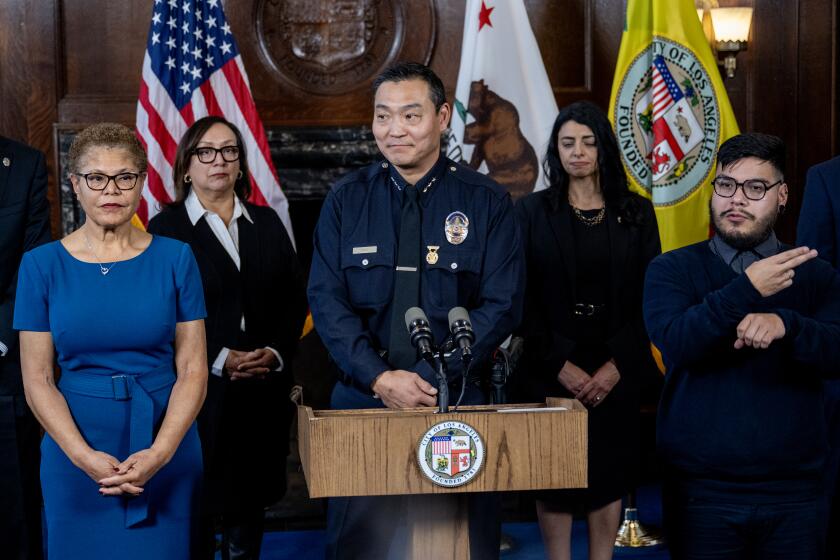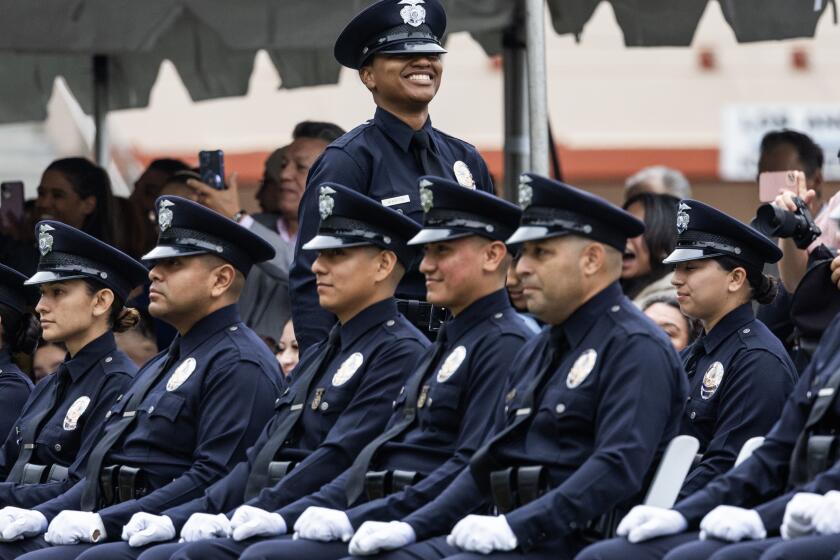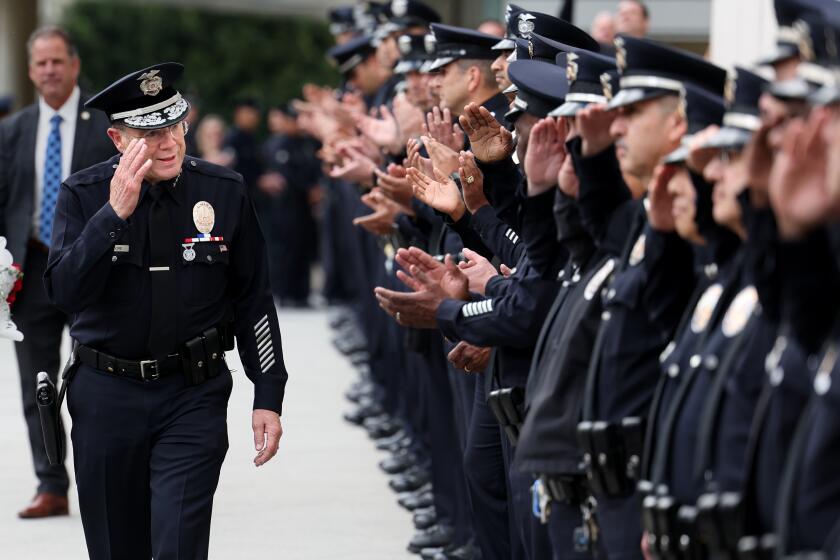Police Commission forwards three LAPD chief finalists’ names for mayor’s consideration

- Share via
The Los Angeles Police Commission has forwarded the names of three finalists for LAPD chief to Mayor Karen Bass — but like much else about the search process, the identities of the front-runners have been kept a secret.
The announcement came as the commission returned from closed session at the end of a special meeting Wednesday. Commission President Erroll Southers said the board had “discharged its duties as set forth in the city charter...and will be forwarding a list of recommended candidates to the mayor,” according to a recording of the meeting.
He then made a motion to adjourn the meeting, without further comment. The brief announcement went largely unnoticed outside the commission, which did not issue a news release or otherwise publicly announce the decision.
The move brings the city one step closer to ending what has been a months-long search for what is widely considered one of the most high-profile and challenging jobs in law enforcement. The post has been vacant since February, when former Chief Michel Moore retired.
Under the city charter, the commission — a five-member civilian body that acts like a board of directors for the LAPD — is required to select three finalists for Bass to consider. But if the mayor is unsatisfied with the choices, she can ask commissioners to send additional names or continue the search. Whomever she picks will then need to be confirmed by the full City Council.
Bass has declined through a spokesman numerous requests for comment from The Times about her priorities for chief, and she did not reschedule an earlier interview about the topic that she had canceled.
Interviews for the Los Angeles’ police chief job began weeks ago, but city officials have not said exactly how many candidates have applied.
Zach Seidl, a spokesman for the mayor’s office, said in a text message there was “[n]othing to share about the search at this time other than the Mayor is continuing to work with urgency on this search and her work to make LA safer.” He did not respond to a follow-up question about whether the mayor had started considering the finalists.
Wednesday’s announcement squares with a previous timeline given by commissioners, who said they hope to finish evaluating what could be dozens of candidates and offer Bass their top three suggestions by the end of August.
That hasn’t stopped fevered speculation among LAPD rank-and-file and command staff about who their next leader will be.
There were at least 25 applicants for the job.
Among the outside executives who received second interviews, according to sources, were Jim McDonnell, a one-time LAPD assistant chief and former Los Angeles County sheriff; former Houston and Miami chief Art Acevedo; and Robert Arcos, a former LAPD assistant chief who works for the L.A. County district attorney’s office. A high-profile former chief from a West Coast department was also said to have applied, but that name has never been confirmed.
Those entries, confirmed by multiple sources, add another dynamic to what many consider a wide-open race to be the city’s next top cop.
The department veterans who received second interviews, sources said, are: Assistant Chief Blake Chow, who oversees LAPD special operations; Deputy Chief Emada Tingirides, commanding officer of the department’s South Bureau; Deputy Chief Donald Graham, who heads the Transit Services Bureau; Deputy Chief Alan Hamilton, head of the Detective Bureau; and Cmdr. Lillian Carranza of the Central Bureau.
Finding the city’s next police chief is one of the most closely watched decisions made by any mayor.
Bass and commissioners have in recent months embarked on a citywide listening tour to canvass residents, officers and business owners about what they want to see in the next chief. The mayor has also made regular visits to police roll calls across the city.
During the community forums, many attendees pushed for the selection of an insider who is attuned to policing in a city as vast and diverse as L.A.
Others talked about the importance of picking someone who understands the complicated history between the department and the communities it polices. And yet, unlike in other recent chief searches, a growing number of people within the LAPD are pushing for an outside candidate to breathe new life into the organization.
The process has been shrouded in an unusual level of secrecy.
As many as 10 candidates have been invited back for second interviews, sources say.
Although the names of candidates have occasionally been withheld to protect the identities of those working in other cities, officials this time have also declined to reveal how many people applied for the position, only saying that the number was “more than 25.” Sources have since told The Times that the number was more than 30.
In the absence of information, the search has been the subject of almost daily rumors inside the department. A LinkedIn post by a former LAPD sergeant-turned-policing consultant went viral after it claimed to reveal a list of semi-finalists. Among those named in the post was Anne Kirkpatrick, the current police commissioner in New Orleans, who quickly issued denials of any interest in the LAPD job.
At stake is the chance to lead the country’s third-largest local police force at a crucial time in its history. Whoever gets the job will be inheriting a wary department eager for clear leadership and a city worried about crime and the use of force.
One of the key questions facing Bass is whether an outsider would be better at introducing reforms in the organization, rather than someone who has come up through the ranks here and already understands the political and labor landscape.
The Los Angeles Police Protective League, the powerful bargaining body for the city’s rank-and-file officers, has not publicly staked out its position on the insider-outsider debate.
One of Moore’s former assistant chiefs, Dominic Choi, was picked as interim leader. Moore has stayed on as a consultant on the chief search, and Choi has said he will not seek the job permanently.
More risk management than crime-fighting, the job of running the LAPD — a vast, multibillion-dollar organization with more than 10,000 employees that operates under an intense microscope — involves balancing demands that are often at odds:
Even though violent crime numbers have started to level out, with the exception of robberies, anxiety over public safety remains high among many Angelenos; the number of police shootings has also increased, raising concerns from the Police Commission. Meanwhile, any new leader, particularly one from the outside, will be expected to be a quick study and hit the ground running.
Prognosticators have said Bass’ selection will indicate a lot about what direction she thinks the department is headed. Picking someone from within the organization to follow in Moore’s footsteps would signal that the mayor is looking to continue some of the reforms he started but would stop short of the wholesale changes that some have called for.
The LAPD has had only two outsiders serve as chief in its modern history, but there is a growing push to bring in a third.
Choosing an outside candidate would signal that the mayor is seeking a new direction for the department, some observers say. The city has hired only two outside chiefs in the past 75 years: Willie L. Williams and William J. Bratton. Both selections followed seismic scandals: the Los Angeles uprising in 1992 and the Rampart scandal of the late 1990s that saw more than 70 police officers implicated in unprovoked shootings, assaults and evidence-planting.
Experts say the LAPD job is one of the toughest in law enforcement.
Any serious candidate will have to have a proven track record as an experienced leader. The chief must be comfortable speaking extemporaneously — and often in front of cameras — about the work of the police department through the progressive lens of the city’s elected leaders, including the mayor and City Council.
Whoever gets the job will need to navigate through many challenges at once, while dealing with the myriad issues confronting the city, including homelessness and the fentanyl crisis.
The next chief will also have to recruit and inspire a new generation of officers, some of whom weren’t even born when the department was forced to undergo sweeping changes in the wake of the Rampart scandal and who grew of age in the Black Lives Matter era.
The Olympics and the World Cup also loom as security challenges in coming years. Others are keen to see how the next chief will tackle a much-maligned discipline system that, depending on whom one asks, either lets too many bad cops off or has been weaponized to favor the well-connected.
In March, the city hired the Northern California-based headhunter Bob Murray & Associates to conduct the nationwide chief search — the same firm that helped pick Bratton more than two decades ago.
Joel Bryden, a vice president for the firm, said he could not discuss the search, referring questions to city officials.
“It’s our hard and fast rule,” said Bryden, one of the two main recruiters on the chief search. “We at least have kept everything confidential even though leaks have occurred, some accurate, and some not.”
More to Read
Sign up for Essential California
The most important California stories and recommendations in your inbox every morning.
You may occasionally receive promotional content from the Los Angeles Times.













